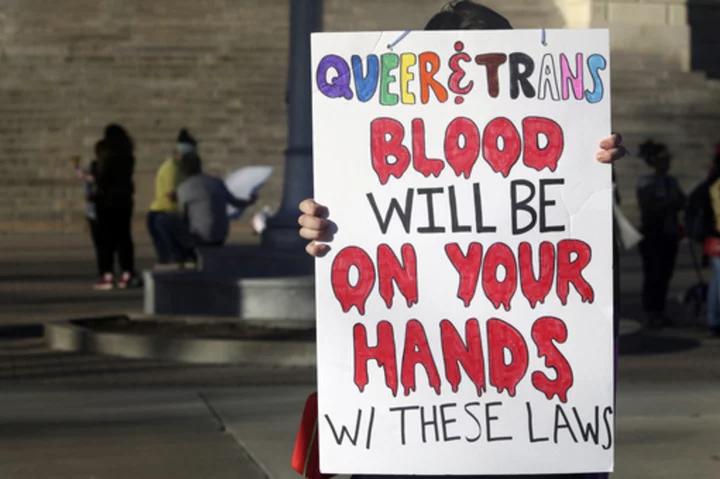JERUSALEM (AP) — Israeli Prime Minister Benjamin Netanyahu on Thursday vowed to press ahead with his contentious judicial overhaul, despite unprecedented mass protests at home, growing defections by military reservists and appeals from the U.S. president to put the plan on hold.
Netanyahu’s message, delivered in a prime time address on national television, set the stage for stepped-up street protests in the coming days leading up to a fateful vote on Monday. Thousands of people marched through central Tel Aviv on Thursday night, while others continued the roughly 70 kilometer (roughly 45 mile) march from Tel Aviv to Jerusalem.
Netanyahu was at times conciliatory during his address, saying he understands the differences of opinion that have bitterly divided the country and offering to seek a compromise with his political opponents.
But he was also defiant, saying his opponents were bent on toppling him and lashing out at the scores of military reservists who say they will stop reporting for duty if the plan is passed.
“The refusal to serve threatens the security of every citizen of Israel,” he said.
Parliament is scheduled to vote Monday on a bill that would curtail the Supreme Court’s oversight powers by limiting its ability to strike down decisions it deems “unreasonable.” The reasonability standard is meant as a safeguard to protect against corruption and improper appointments of unqualified people.
The bill is one of several keystone pieces of the Netanyahu government’s judicial overhaul plan. Netanyahu and his allies say the plan is needed to curb what they consider excessive powers of unelected judges.
Critics say the legislation will concentrate power in the hands of Netanyahu and his allies and undermine the country’s system of checks and balance. They also say Netanyahu, who is on trial for corruption charges, has a conflict of interest.
The proposal has bitterly divided the Israeli public and attracted appeals from U.S. President Joe Biden for Netanyahu to slow down and forge a broad national consensus before passing any legislation.
Tens of thousands of Israelis have joined mass protests against the overhaul since it was proposed in January, and business leaders have said that a weaker judiciary will drive international investors away.
But perhaps the biggest threat to the plan are growing calls by military reservists who say they will stop reporting for duty in key units. They include fighter pilots, commandos and cyberwar officers.
Israeli leaders and military commanders have expressed growing alarm, saying the refusals to serve could hurt the country’s security. Reservists, whose service is voluntary, make up the backbone of Israel’s military.
On Thursday, the former head of Israel's Shin Bet internal security agency, Nadav Argaman, voiced support for the reservists.
Speaking to the Army Radio station, Argaman leveled withering criticism at Netanyahu, saying he appears committed to preserving his ruling coalition of ultranationalist and ultra-Orthodox parties, not the state itself, and said he was “very worried that we’re on the verge of a civil war.”
“We need to stop this legislation by any means,” he said, voicing support for reservists who “are very concerned and fearful for the security of the state of Israel.”
Argaman was appointed head of the Shin Bet by Netanyahu in 2016 and stepped down in 2021.
Netanyahu said the refusals to serve undermined Israel's democratic institutions, in which the army is subordinate to the government and not the other way around. “If they succeed in carrying out their threats, that is a blow to democracy,” he said.
The judicial overhaul plan, which was announced shortly after Netanyahu took office as prime minister following November's parliamentary elections — Israel's fifth in under four years — has divided an already highly polarized country.
Netanyahu froze the legislation in March following weeks of demonstrations and mounting labor strikes, but revived the plan last month after talks seeking compromise with opposition lawmakers failed.
Critics say removing the reasonability standard would allow the government to appoint unqualified cronies to important positions without oversight. They also say that it could clear the way for Netanyahu to fire the current attorney general — seen by supporters as a bulwark against the overhaul plan — or appoint legal officials who could ease his way out of the corruption charges he is facing in an ongoing trial.
Netanyahu now heads the country's most ultranationalist and religiously conservative government in Israel's 75-year history.









